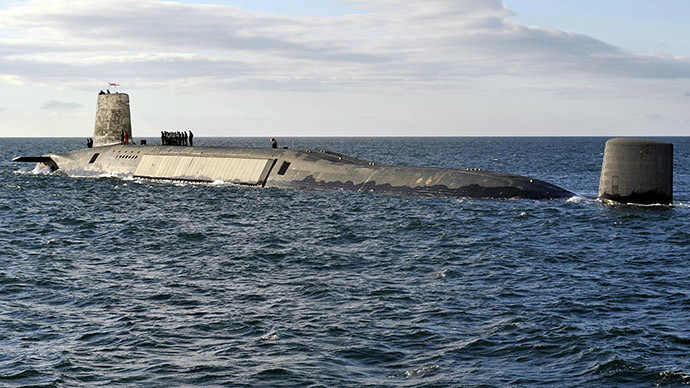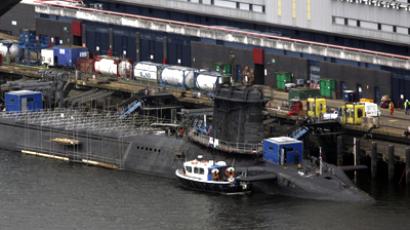‘National debate’ on UK nukes if Trident removed from Scotland

Moving nuclear submarines and missiles from Scotland to England’s south coast would create a “national debate” about the future of the UK’s Trident program, according to a top researcher.
A leading military think-tank claimed last week that Britain's Trident nuclear missile base could be relocated to Plymouth if Scotland were to vote for independence on September 18.
Malcolm Chalmers, who compiled the report, took part in a discussion on the Jeremy Vine Show on BBC Radio 2. Vine asked Chalmers whether the proposed move to Devonport, Plymouth, would prompt the UK Government to reassess whether the country needed nuclear weapons at all.
“Basing Trident in the South West of England is inferior in all sorts of ways to basing it in Scotland and would require some additional costs and a lot of looking at safety cases,” Chalmers explained. “A lot of local people would not like suddenly the appearance of lots of Scots workers, never mind nuclear weapons on their territory, so it would provoke a national debate.”
The report by the Royal United Services Institute (RUSI) claimed that while any relocation could not be completed by the 2020 target date proposed by the Scottish government, it could be put off until the new fleet of Trident submarines enters service in 2028.
The SNP Scottish government has set out its plans to remove Trident from Scotland if September’s referendum secures a “Yes” vote, arguing that the £100 billion required to update Trident would be better spent on health, education and housing in an independent Scotland.
Opponents say the cost of moving the submarine base from Faslane and the nuclear warhead depot at Coulport would be exorbitant. RUSI estimates the relocation would add £3.5 billion to the cost of retaining the UK's nuclear forces. The cost of the overall nuclear deterrent program over 25 years is estimated to be £80 billion.
“It is a very complex and difficult job, and we can’t be sure sitting outside government that it would be feasible, but we’ve based our cost estimate on how much it cost to build comparative facilities in the past,” Chalmers said. “The most difficult issues are around meeting the high safety measures rather than costs.”
Devonport in Plymouth, the base for conventionally-armed nuclear submarines, would be the most obvious alternative to Scotland’s Faslane, claims the report. Among the safety concerns raised in the RUSI report is the possibility of accidental ignition of the warheads in a heavily populated area of the UK.
Chalmers said he believes no decision would be made on whether to renew Trident in 2016 until the UK government is clear where the submarines and missiles would be located. He added that the issue of the future of Trident could be used as a “bargaining card” for the new Scottish government in the event of independence.
Commenting on the report last week, Scottish National Party (SNP) Westminster Leader and defence spokesperson Angus Robertson MP said the UK government’s Trident “obsession” highlights the democratic deficit that Scotland faces under Westminster control. He went on to call new generation of Trident nuclear weapons “an obscene waste of money” that ought to be used on public services.
“This report puts to bed some of the ridiculous claims being put forward by the No campaign, including UK government ministers, on removing Trident from Scotland,” said Robertson.
“We are clear, however, that getting rid of Trident from Scotland by 2020 is a perfectly reasonable timescale – indeed, Westminster's own Scottish Affairs Committee reported that Trident could be 'removed within months.'”














